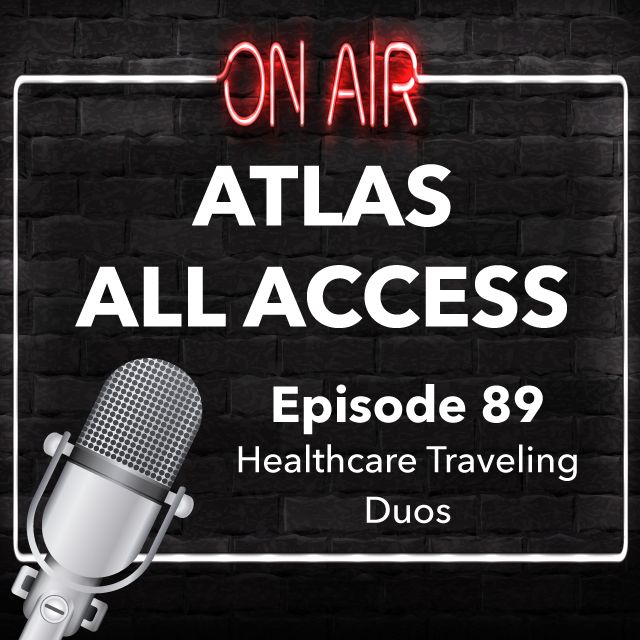
Healthcare Traveling Duos, Trios - Atlas All Access #89
10-12-2019
The dream of #traveling with your best friend is completely possible. You just have to be aware of the extra challenges that come with it. In this "Atlas All Access" we answer some of the most asked questions for pairs looking to travel as a duo, or even a trio! Yes, it can be more complicated, but you have a support team that has your back. Rich Smith wants you to remember the most important thing: when you land that contract together, "Have a ton of fun!"
Get to Know Your Atlas Team
Braden: https://atlasmedstaff.com/atlas-team/braden-boex/
Mike: https://atlasmedstaff.com/atlas-team/michael-spies/
Jackie: https://atlasmedstaff.com/atlas-team/jackie-ryder/
Becca: https://atlasmedstaff.com/atlas-team/becca-jaquis/
Tiffany: https://atlasmedstaff.com/atlas-team/tiffany-agosta/
Rich: https://atlasmedstaff.com/atlas-team/rich-smith/
Rich Smith: Sometimes as we're filming different pieces of content, we realize this could be something bigger here. What you're about to see is a compilation of a number of different interviews that we did just recently about placing duos and trios, not only from a compliance standpoint and a recruiter standpoint, but then also from a hospital and client management standpoint. So you're going to get every step of the process here. On this episode we talk about the perils and pitfalls and the positives of being a duo and getting a contract together. Atlas, all access starts now.
Rich Smith: What is some advice for potential traveling healthcare pairs?
Braden Boex: The biggest advice that I have traveling as a duo is you have to be almost extra flexible, especially in areas where maybe there's not as many jobs.
Jake Brower: I've had a lot of experience working with partners and I think that in a lot of ways it's becoming more of a trend. A couple of things to look at and think about when you are traveling duo or trio. I've seen from time to time a little bit harder, talk about that in a minute. Every traveler has to decide why they're traveling and what their purpose and what they're hoping to get out of it actually is. A lot of times travelers run into problems when they have multiple things that they are prioritizing in their travel journey. So if a couple of nurses call me and they say, "Hey, we want to work together and we want to travel in the same cities," there's all kinds of filters you can put on your search. Some duos will say we want to work the same shift.
Jake Brower: We want to work in the same hospital, we want to work the same unit. The more filters you put on your search for a job, the more difficult it is going to be to find that job. So one of the things to think about, if you're thinking about traveling with a partner, how important it, how important is it for you to travel with that person. If traveling with them is your number one priority, you're probably going to have to settle on a couple other things like shift, like pay, like even location. So that's just a couple of things to think about when you're going to travel with somebody. Their demands will always impact your ability to get a job.
Mike Spies: So, I have also, one thing to think about is transportation. Currently I have two sets of travel partners that are working for us up in the Northeast and they work at separate, they share housing. They're at separate facilities and in one case they're in separate towns separated by 30 miles. So you have to consider your transportation. If you're in the same town and you're working at different facilities, public transportation can play a big part of that and working that out. Think about your travel, how if one's working here and one's working there, how are we going to do that? Different cities, it's almost necessary to have two cars. So, that is something to think about as you're planning where you want to go and what you want to do.
Jake Brower: Thinking about trios, I've worked with two, actually, both times I placed these trios, it actually happened relatively easy, which is not something that is typical. It's hard enough to find two jobs in the same location but three in the same location. If you're thinking of traveling with more than one travel buddy, you're going to have to be really, really flexible, which both of these trios happen to be open on pay, open on location, open on just about anything. Even willing to go outside of your specialty potentially. One member of a trio I most recently placed at Tulane University hospital in New Orleans. She was actually a PACU nurse and she decided to switch to ICU cause they had three ICU openings and it worked out for her and for all three of them. So flexibility is the name of the game. It's a great way to save money while you're on assignment, share housing. It's a great way to enjoy your journey and shared experience with somebody that you really enjoy.
Braden Boex: The cool thing about duos when it comes to interviewing for jobs is, as long as one of you gets an interview, you actually have a bit of an opportunity to help make sure that your friend or spouse or whoever you're traveling with also gets their interview. So, if your interview goes well and you're vibing with the manager or anything like that, it's really easy at the end of that conversation to say, "Hey, by the way, I'm also traveling with this person who's also submitted and is really interested in your unit. I think that they would be a great fit, but if you could keep them in mind, I would really appreciate it."
Braden Boex: A lot of times managers, if they're right there, you can get them on the phone interview with the manager right then just by handing the phone two feet to the right or the left. I work with, a picky duo right now that we're working on getting jobs at Colorado Children's and one of the gals interviewed last week and interview went really, really well with the manager and at the end she was able to point out to the manager,
Braden Boex: Hey, my friend is also has a lot of experience traveling at a lot of high quality children's hospitals like I do, but the dates that you're asking for are a January 28 start and she needs the fourth because she needs to fill out a fulfill a obligation to her current hospital, so she can't start until February fourth but she'd love the opportunity to interview if you can.
Braden Boex: And the manager made a note of her name and told my nurse that was interviewing to, Hey tell your agency to send her profile through because I want to talk to her and interview her and I want to see what I can do to make sure that we can get her on staff because of your recommendation.
Rich Smith: What does a client management side look like for a traveling pair?
Mike Spies: As a client manager, when I get presented with travel partners, it's a good thing for the hospital if the hospital can make it work. And what I kind of want to talk about is some red flags from the travel partners that can help you be more marketable to the facilities. And one is absolutely, you have to be flexible as to, as far as do you need same shift, do you have to have the same schedule? That can be kind of a turnoff to the facilities because they need the flexibility to put staff into different areas as it presents itself. That's why they bring in travelers, is for the flexibility. But when it works, it works. And so the main thing when I market, when one of the recruiters come to me and says, I've got travel partners, the first thing I ask is do they have to have the same schedule?
Mike Spies: No. Great. Do they have to have the same shift? By schedule, I mean, do they have to work the same days, have the same days off? Do they need to have the same shift or they need to have, you know, days versus nights. So the more flexible that you can be, the easier it is for me to really sell your strong points as a nurse. Cause keep in mind there are other profiles going in to these positions, especially for a real popular winter donut, a destination, like say you're going to Arizona or California or just anywhere south where there's not snow in the winter. There's a lot of people that want to do that and you've got multiple profiles that are going in by profile, I mean that's your resume and so anything I can do to make you stand out, go to the top of that list of who they want to hire.
Mike Spies: One thing to keep in mind, let's just use Boston for any big city, but I'll use Boston as example. I am not exclusive to every single hospital in Boston. There may be another client manager or two here in at Atlas Med Staff that may be working this facility. And I work this facility and there's openings at different facilities. So it is not uncommon for, as a travel pair, one of you may be working with one client manager at this hospital and one of you will be working with a client manager at another hospital. It's up to the us, the client managers, to coordinate that for you. For you, the nurses, your recruiter is the bridge to that. I mean you guys will have that recruiter and that recruiter will work with us so that we can kind of coordinate getting you both placements at two different facilities.
Mike Spies: A little more complicated, because facility A might have 17 resumes for this job and facility B might have two and one might get interviewed and offered well before the other one and it's all contingent on waiting. That's a juggling game that us CMs need to handle. And you can show a little patience, we want to place you, we want to get you that position and I want you to understand that we are doing everything we can to do that. And so when your recruiter says client manager's working on it, believe me, we are and it's just overcoming those obstacles of two different areas.
Rich Smith: What does the compliance process look like for a traveling duo?
Jackie: I'm Jackie. I am a quality assurance with Alice Med Staff, and I'm going to talk a little bit about the compliance requirements when it comes to duos. You would assume that since you're both traveling to the same place that your requirements are going to be the same but, unfortunately, it's not that simple. A lot of it's going to be based on the unit that you're going to. We go through your records and if some of your items weren't completed at the same time and they're annual requirements, then one person in the duo on might have to update some things while the second person in the duo is good for another six to eight months.
Jackie: Some of the competency testing can be different as well, depending on what unit you're going to. When you're going to separate hospitals, that's where it gets really confusing because although you're in the same city and in the same state, you're going to two different hospitals and all hospitals have different requirements, so there may be some things that are required for one person, in the duo that is not required for the other. Unfortunately, we don't make the requirements, so we just have to fulfill the facilities requirements. So, there can be some confusion on those ends there as well.
Jackie: When you're traveling as a duo and you're going to two different facilities, you may actually end up working with two different compliance representatives with Atlas. So it can be common for one person in a duo to start sending all documents for both travelers, which is very convenient if you're both at the same hospital. But if you're both at different hospitals working with different compliance reps, then that's going to get a little bit confusing when you're transferring that information over. Typically we look for the email address and we associate it with the individual that's traveling. So if there's one person that's usually in control of the paperwork and one person that kind of just sits back and lets their partner traveling, traveling duo, send that information over, it's always a good idea to identify and label those documents with each other's names so that it leaves less room for error when those documents are getting submitted and filed. So the overall thing to keep in mind is, although you may be traveling as a duo, you're going to the same location together. Your compliance requirements may vary for any reason.
Rich Smith: This one gets complicated. What if you're a nurse slash allied duo?
Becca Jaquis: My traveler was an ICU nurse and, if you don't know already, we have an allied division here and the nurse's husband is a respiratory therapist. And so in something like that, I had to team up with his recruiter who is an allied recruiter and that's a little bit different.
Becca Jaquis: It looks a little different than if I were to have two nurses or three nurses because I'm working with the same people. I wasn't working with the husband. So Tiffany Augusta was working with him as the allied side. And then I was working with the wife on the recruiter side. And in something like that it is going to look a little bit differently. We really had to put our heads together to kind of figure out where they were going to go licensing wise and then compliance wise as well because as a nurse, my nurse's compliance is going to look a lot different than a respiratory therapist compliance and remember we have what we require as far as Atlas is concerned for Jcaho certifications and then the hospital on that side is going to have something different. And with this, particularly again because he was a therapist or is a therapist, excuse me and she's nurse, the compliance can look a lot differently.
Jackie: The differences between nursing and allied can also vary depending on the facility's requirements, so you do have to keep in mind not only where you're going and if you're going to the same hospital, but if you are a different type of traveler, than that can definitely make an impact on their requirements.
Becca Jaquis: Tiffany and I really had to work together in different divisions of Atlas to get these two travelers placed and it can, like I said before, it can really work well as long as you are communicating with your travelers and with the client managers on that side and then, in this case, with another recruiter who we placed a duo but she has therapist and I have the nurse, so that's considered a duo at the same hospital.
Rich Smith: So that's it. That wraps up our discussion on duos. It's a lot of information, I know, but traveling in general is a lot of information and when you double up and you travel with a friend, boyfriend, girlfriend, partner, wife, somebody you just met, somebody that's cool at the hospital and you want to hang out for a while, there's a lot more to do. So just be prepared. Think of it as separate but equal. You're both taking your own contracts even though you're going together. It may not look anything like the other person's information. Work through yours, and then once you get to the contract, have a ton of fun. We'll see you next week.



